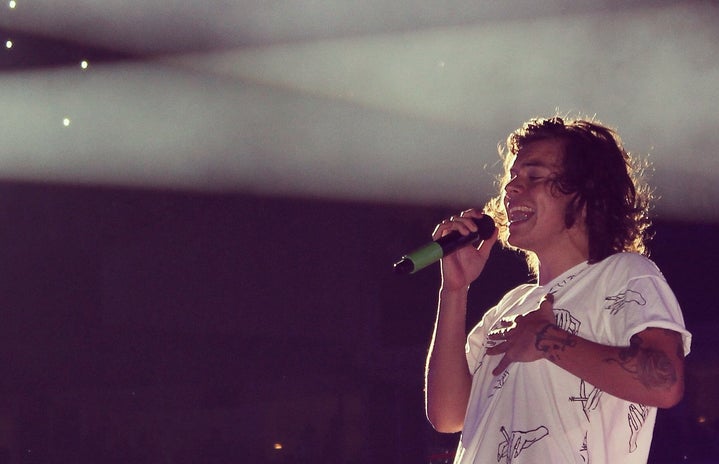If you have had access to the internet anytime in the past ten years, I’m willing to bet that you know who Harry Styles is. Whether you’ve been a diehard “directioner” since middle school, or you started following him when he went solo, or you simply scoffed at his songs on the radio and claimed that you “didn’t get the hype,” Harry’s cheeky grin and signature curly hair have been basically unavoidable for consumers of pop culture.
His charm and talent have paved the way for a strong, successful career for over a decade now, which has surpassed expectations for a former boyband star. This type of fame and adoration that stems from boy bands tends to fade into irrelevance once the hype has died down or the band breaks up, but the latter fate has given Harry an even bigger platform to jump off into greater stardom. The explanation as to why so many people, largely young women, are so in love with Harry may seem as simple as that fact that “he’s just so cute,” but there’s more to the hype than just the looks and the hair. There are many aspects of Harry that go against the status quo, not only in terms of male celebrities, but young men in general. Harry is the very antithesis of what society and popular culture tell men that they should be: he is vulnerable, soft-spoken, and flamboyant in his fashion choices. In the 21st century age of breaking down social constructs and defying the norms of gender and personal expression, Harry Styles represents a shift in what men can be and are becoming in our progressive age.

Although Harry is not the image of the alpha male that society wants women to idolize, he has still been just as, if not more, of an obsession-worthy figure for young women everywhere. Harry’s assertion of a new type of masculinity and women’s frenzied acceptance of it just goes to show that what society defines as an ideal man is changing. The praise Harry receives for his iconic and at times androgynous fashion reflects the ideals of a growing generation that is not only accepting – but encouraging – of men who aren’t afraid to defy constrictive gender norms.

Even in the early days of One Direction, Harry would push back at interviewers who attempted to dig into his romantic relationships, firm in his conviction that he wouldn’t want to objectify women, and he has mentioned many times that growing up with his mom and sister taught him how to treat women with respect. He has also been famously vague and private about his sexuality, a subject that the media loves to constantly pester him about despite his transparency about not wanting to put labels on himself. Despite interviewers whose old-fashioned, misogynistic minds still think it’s cool and manly to brag about sexual conquests (looking at you, Howard Stern), Harry continues to show us that this kind of sexist and heteronormative showboating doesn’t interest him. This is apparent when Harry is interviewed by someone who isn’t trying to paint him as something he’s not, such as his interview with Apple Music’s Zane Lowe about his Fine Line album, where we get to see Harry express his truth and his intellect, as well as how he truly feels about matters such as love and sex — topics that most people would rather create a false image of for their own sake. When Harry is able to express himself in an unfiltered, unbiased environment, he is able to show the world who he is on his own terms: someone who isn’t afraid of vulnerability and showing emotion, and who has no issue sharing that Fine Line is “all about having sex and feeling sad,” because no one pushed him to reveal more than what he was comfortable with. This rejection of the womanizing heartbreaker image coupled with Harry’s ever-growing success and popularity just goes to show that young women don’t want some misogynistic “bad boy” image to fawn over, but rather a respectful, vulnerable man who is unapologetically himself.

At a glance, it may seem like the classic “fully dressed macho man surrounded by scantily-clad women” trope that we see far too often (ahem, “Blurred Lines”), but it is clear that the video is not about objectifying women to make Harry seem more “manly.” The video is “dedicated to touching,” a cheeky shout out to the fact that the video was released in the midst of a global pandemic where social distancing became the norm. This dedication is not meant in an obscene way, but rather more about simple human connection. The video is three minutes and nine seconds of humans simply laughing and having a good time, unbothered by any pretense or judgments or labels, which is everything that Harry’s personality and attitude represents. It’s no wonder that his open-mindedness and positivity have continued to draw people in for over a decade now, and he’s still only just getting started.


